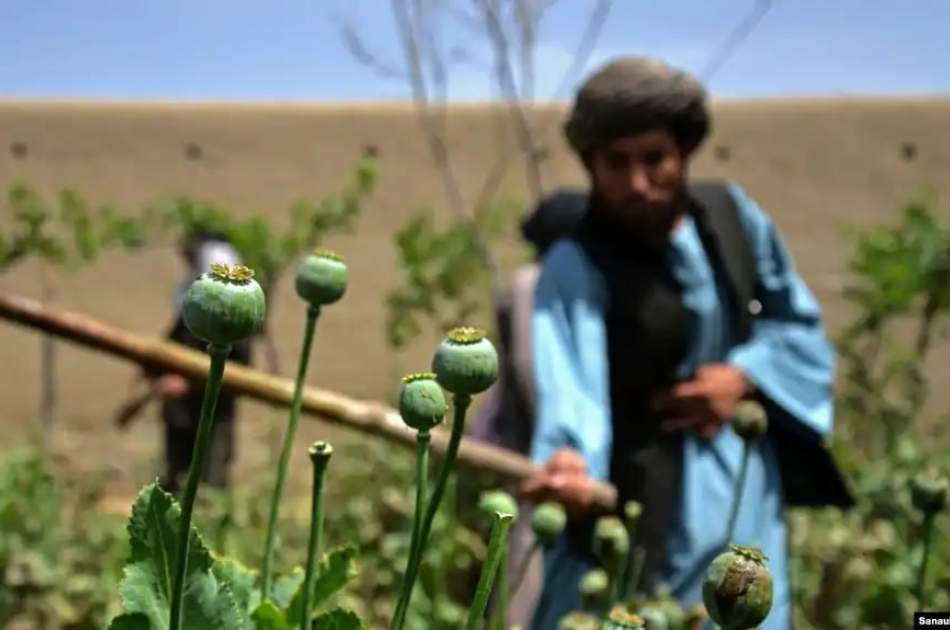Following the publication of the United Nations report, that poppy cultivation in Afghanistan has decreased by ninety-five hundred in 2023; Experts in the agriculture sector say that the strict laws of the Islamic Emirate to prevent the cultivation of poppy, increasing the cultivation of hing, saffron and cotton in the country have caused the poppy cultivation to decrease in Afghanistan.
Publish dateTuesday 7 November 2023 - 09:33
Story Code : 279918
Experts in agriculture department:
Strict laws, promotion of hing, saffron and cotton cultivation; It has caused a decrease in poppy cultivation in Afghanistan
Afghan Voice Agency (AVA) - Kabul: The United Nations Office on Crime and Narcotics, in a report published on Sunday, November 6, stated that after the order of the authorities of the caretaker government of Afghanistan in connection with the prohibition of poppy cultivation, the cultivation of this Materials have been reduced by ninety-five percent.
In this report, it is stated that poppy was cultivated on more than 330,000 hectares of land last year, and on nearly 11,000 hectares of land this year, and the production of opium has also decreased dramatically compared to last year.
"This is a real opportunity to achieve long-term results against the illegal opium market and the harm it causes locally and globally," said Ghade Wali, Executive Director of the United Nations Office on Drugs and Crime. "At the same time, there are important consequences and risks that must be taken into account for an ultimately positive and sustainable outcome, especially for the people of Afghanistan."
But the Islamic Emirate response to this report, says that the cultivation and production of drugs in Afghanistan has now reached zero; Zabihullah Mujahid, the spokesman of the Islamic Emirate, said: "Our information is that poppy cultivation has decreased by 100 percent, if we look at last year's forecast, in some remote or mountainous places, and there are still in some Chahardiwali, which are also destroyed. have been taken."
The spokesman of the Islamic Emirate added that no country has cooperated with Afghanistan in the field of alternative cultivation: "There has been no proper cooperation in this sector by any country. The Islamic Emirate has provided services to the best of its ability. For example, we suggested saffron cultivation as an alternative to cultivation.
Meanwhile, Nasir Majidi, an expert in the agriculture department, said in an interview with AVA that the strict laws of the Islamic Emirate to prevent the cultivation of poppy, the increase in the cultivation of hing, saffron and cotton by the country's farmers have caused a decrease in the cultivation of poppy in Afghanistan.
Majidi, stating that with the prohibition of poppy cultivation by the leaders of the Islamic Emirate, the country's farmers started to cultivate hing, zaghofran and cotton, he expressed that the cultivation of hing, zaghofran and cotton is a good alternative to poppy cultivation, the Islamic Emirate in order to expand Cultivation of these plants should seriously cooperate with farmers in the field of packaging and export to foreign countries.
He also emphasized that if the Islamic Emirate does not cooperate seriously with the farmers in the alternative sector of poppy cultivation, in the future, the farmers will be forced to cultivate poppy again.
At the same time, Nourullah Sabouri, a political expert, also said in a conversation with AVA that when the Islamic Emirate came to power in Afghanistan, most of the countries in the world and the region were afraid of the increase in poppy cultivation and the expansion of the activities and attacks of terrorist groups in Afghanistan and the region, but the Islamic Emirate during The past two years have proven that it has been more successful than ever in preventing the cultivation of poppy seeds and the expansion of the activities of terrorist groups.
Expressing that although the fight against drug cultivation and trafficking is not the work of one country and requires regional and global cooperation, he added that the Islamic Emirate alone, without the cooperation of the countries of the world and the region, was able to prevent this phenomenon to a large extent in the shortest time.
This political expert also emphasized that drug dealers do not have the courage to sell these drugs due to the strict laws of the Islamic Emirate, the addicts have been collected and are being treated, therefore the cultivation and production of all kinds of drugs and the demand in the domestic markets have decreased.
Also, Abdul Malik, one of the farmers of Nangarhar province, told Ava that farmers grow poppy due to economic problems and lack of water.
This farmer pointed out that, unfortunately, other products of farmers, such as tarkari and fruit, are not packaged in a standardized way to be exported to foreign countries, therefore, every year, they are sold at a low price in the country's markets and are even worn out.
It should be remembered that the leader of the Islamic Emirate banned the cultivation of poppy in a decree last year and ordered the security forces to prevent the cultivation of poppy.
avapress.net/vdcfy1d0cw6de1a.r7iw.html
Tags
Top hits







